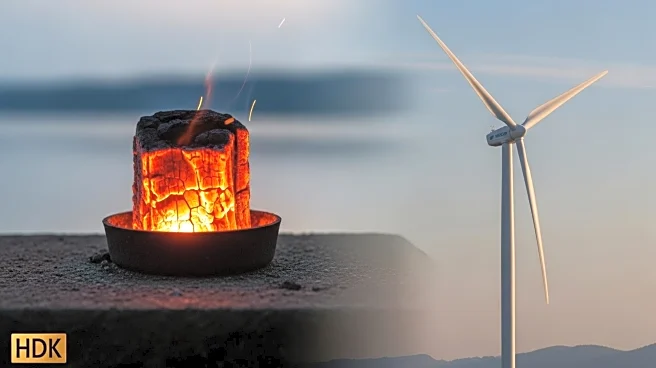What is the story about?
What's Happening?
Vedanta Ltd, an Indian mining and metals conglomerate, has announced its decision to maintain coal as its primary energy source for mining operations. Despite the global push towards clean energy, Vedanta plans to increase the share of renewable sources in its energy mix. Currently, coal accounts for nearly 70% of Vedanta's energy consumption. Deshnee Naidoo, CEO of Vedanta Resources, stated that coal will remain the baseload contributor for the company. However, Vedanta aims to reduce its reliance on coal-based power to 50-60% over the next three to four years by incorporating solar, wind, and hybrid models. The company is also investing in low-carbon products such as aluminum and zinc, utilizing renewable energy and hydrogen in its manufacturing processes. Vedanta is exploring similar energy transitions in its overseas operations, including a planned 300-megawatt power facility in Zambia, split between coal and renewables.
Why It's Important?
Vedanta's decision to continue using coal while gradually increasing renewable energy sources highlights the challenges faced by industries in transitioning to cleaner energy. This approach reflects the balancing act between maintaining current energy needs and pursuing decarbonization goals. The company's investment in low-carbon products and renewable energy sources indicates a strategic shift towards sustainability, which could influence other companies in the sector. The impact of Vedanta's energy strategy is significant for the mining industry, as it may set a precedent for how companies manage energy transitions while maintaining production levels. The move also has implications for global efforts to reduce carbon emissions, as Vedanta's operations span multiple countries.
What's Next?
Vedanta plans to ramp up copper production at its Zambian unit to 300,000 metric tons over the next three years, while continuing to explore energy transitions in its operations. The company is also scaling up the production of low-carbon products, which currently constitute less than 20% of its total output. In India, Vedanta has no immediate plans to venture into lithium mining, citing the country's limited exploration potential. The company's ongoing efforts to integrate renewable energy sources and low-carbon products into its operations will be closely watched by industry stakeholders and environmental groups.
Beyond the Headlines
Vedanta's strategy to maintain coal as a base energy source while increasing renewable energy usage raises questions about the ethical and environmental implications of such decisions. The company's approach reflects the broader industry challenge of balancing economic growth with environmental responsibility. As Vedanta navigates this transition, it may face scrutiny from environmental advocates and policymakers pushing for more aggressive decarbonization measures. The long-term impact of Vedanta's energy strategy could influence regulatory policies and industry standards related to energy consumption and sustainability.















